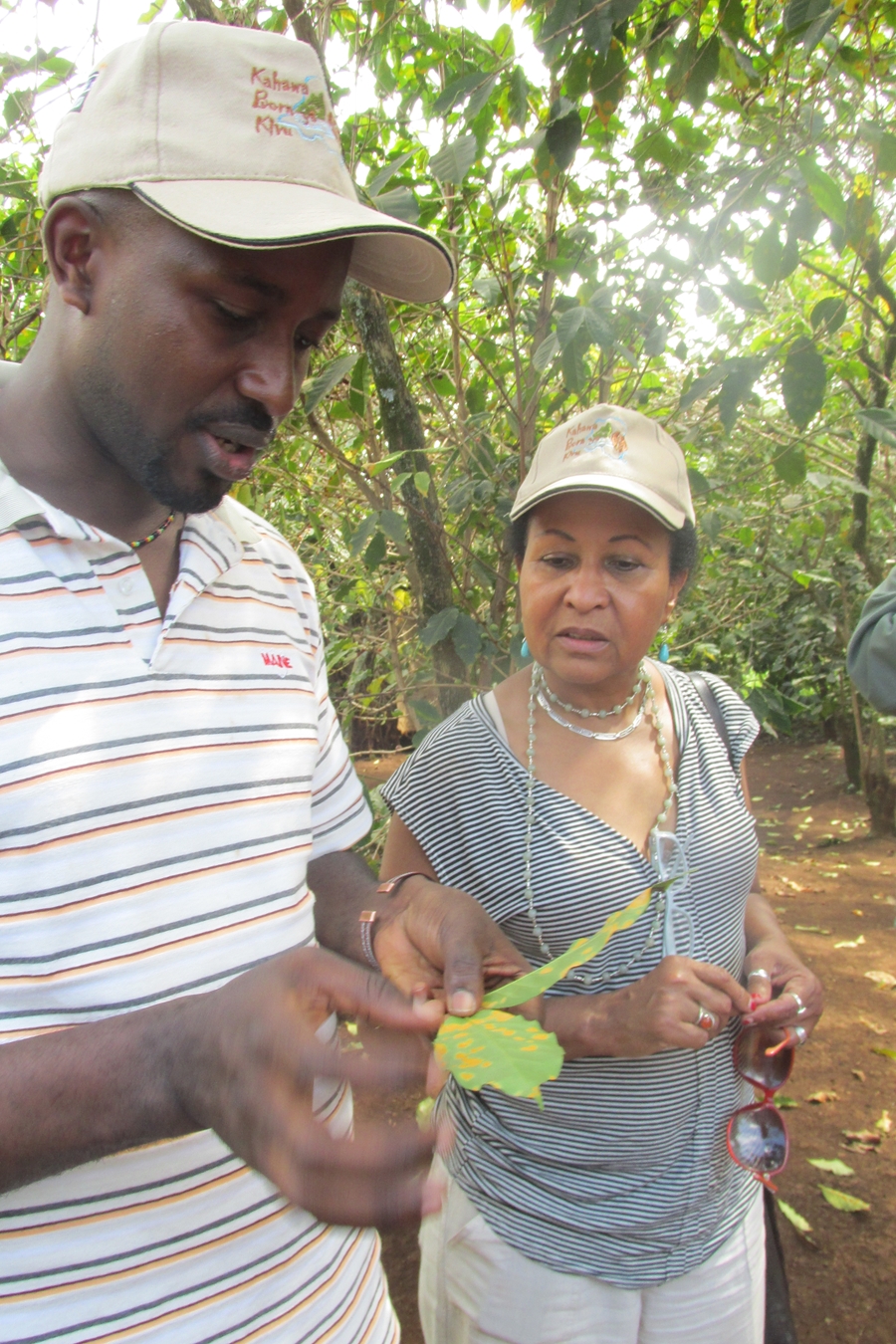Graduate Student Helping Ease Burden of Congolese Women Farmers

Willy Mulimbi Byamungu, left, examines coffee rust on a coffee plant leaf with a Catholic Relief Services representative in Kabamba, South Kivu, Democratic Republic of the Congo.
In the Democratic Republic of the Congo, women are not only the primary caretakers, but they are also the primary laborers, making up 70 percent of the nation's farmers. University of Arkansas graduate student and Congo native Willy Mulimbi Byamungu is actively implementing agricultural solutions to help increase farmers' crop yield, so to ease one of the many burdens of Congolese women.
"There have been a lot of conflicts in my country, and most of the time the first victims of those conflicts are women; they are among the most vulnerable in my country," he said. "Women have to take care of crops, they have to take care of their families, they have to take care of their household, they have to take care of health care. It's really a lot."
In 2009, while working with Catholic Relief Services, Mulimbi Byamungu began to better understand challenges women farmer's face and to implement strategies to improve agricultural activity and food security for these women in post-conflict areas of Congo.
Mulimbi Byamungu and his colleagues found most farmers were not properly managing their land. After two or three planting seasons, farmers were forced to move to a new plot of land, because the soil had lost its fertility. The distance between a farmer's home and her plot of land gradually grew further and further apart, so she was traveling long distances to tend to her crop.
To help resolve this issue, Mulimbi Byamungu worked with Catholic Relief Services to help farmers increase productivity and manage soil through conservation agriculture. Conservation agriculture is based on three tenants: not tilling the land, covering the land with mulch and practicing crop rotation.
"By applying these techniques, women have been able to increase their yield and better manage their natural resources in the province of Maniema," Mulimbi Byamungu said. "Traditionally, women who rely on crops for food and income have not been able to cultivate large pieces of land, but with conservation agriculture women are finding they have more time and more success with their crops, so increasing their land size is a real possibility."
Mulimbi Byamungu found 70 percent of farmers who were introduced to conservation agriculture techniques put those techniques into practice. He found three factors that were primary predicters as to whether a farmer would adopt the conservation agriculture methods.
First, he found farmers who live in the savannah are more likely than farmers who live in the forest to adopt the practices.
"We found farmers in the savannah were 26 percent more likely to adopt than those in the forest," he said. "We also found those who adopted the practices in the forest zone preferred to go back to their previous fallows."
Second, he found farmers with access to credit tend to adopt the practices more quickly than farmers without access to credit.
"From a woman's perspective, this makes sense," he said. "The access to credit helps with the agricultural expenses, but it also helps with the domestic expenses. Women see the bonus of using extra money to help with household expenses, and they know they can pay it back because the new practices are helping to increase the crop yield."
Third, he found non-married women farmers are less likely to adopt the practices than their counterparts.
"This almost contradicts the purpose of the project, which had the initial purpose of helping vulnerable women; single women are the most vulnerable," he said. "However, we did find that non-married women who belong to farmer groups are more likely to adopt than those who don't belong to farmer groups, because those in the farmer groups feel more supported by their community."
Mulimbi Byamungu was pleased to find most farmers continue to practice conservation agriculture methods, even after the Catholic Relief Service project ended in 2012.
"Most people who live in rural areas of my country rely on non-governmental organizations for support," he said. "Most of the time, when a program ends, the people are so disappointed that they abandon the new practices. However, I have found people are still using the conservation agriculture practices, which is encouraging."
Mulimbi Byamungu, who is advised by Dale Bumpers College of Agricultural, Food and Life Sciences associate professor Lawton Lanier Nalley, is on track to complete a master's degree is agricultural economics in spring 2018 and plans to continue his research when he begins the doctoral program in environmental dynamics in fall 2018. He is attending the University of Arkansas as a Fulbright Scholar.
Topics
Contacts
Amanda Cantu, director of communications
Graduate School and International Education
479-575-5809,
amandcan@uark.edu
Headlines
PetSmart CEO J.K. Symancyk to Speak at Walton College Commencement
J.K. Symancyk is an alumnus of the Sam M. Walton College of Business and serves on the Dean’s Executive Advisory Board.
Faulkner Center, Arkansas PBS Partner to Screen Documentary 'Gospel'
The Faulkner Performing Arts Center will host a screening of Gospel, a documentary exploring the origin of Black spirituality through sermon and song, in partnership with Arkansas PBS at 7:30 p.m. Thursday, May 2.
UAPD Officers Mills and Edwards Honored With New Roles
Veterans of the U of A Police Department, Matt Mills has been promoted to assistant chief, and Crandall Edwards has been promoted to administrative captain.
Community Design Center's Greenway Urbanism Project Wins LIV Hospitality Design Award
"Greenway Urbanism" is one of six urban strategies proposed under the Framework Plan for Cherokee Village, a project that received funding through an Our Town grant from the National Endowment for the Arts.
Spring Bike Drive Refurbishes Old Bikes for New Students
All donated bikes will be given to Pedal It Forward, a local nonprofit that will refurbish your bike and return it to the U of A campus to be gifted to a student in need. Hundreds of students have already benefited.




